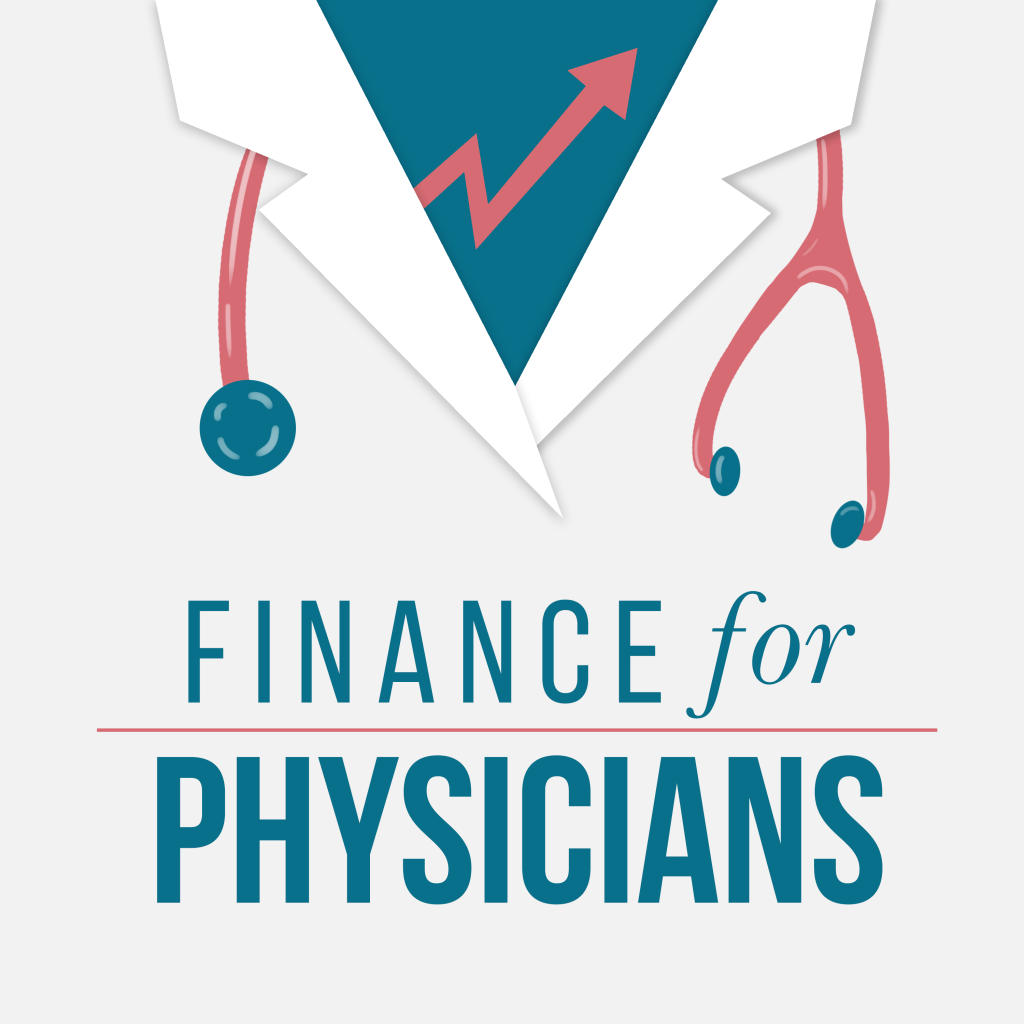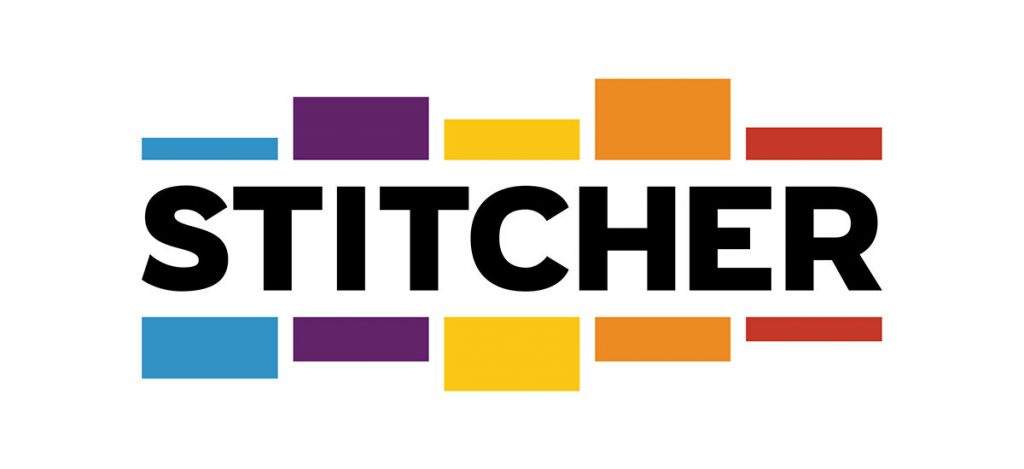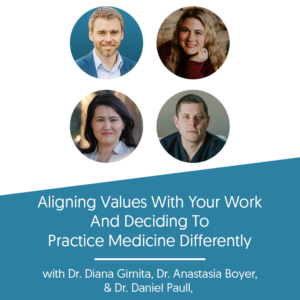Join Daniel Wrenne and Jeff Wenger on an enlightening episode of “Finance for Physicians,” where they explore the dynamic world of student loans, financial planning, and more. In this engaging conversation, Daniel and Jeff discuss recent updates and developments in the field, offering valuable insights and strategies to empower physicians in managing their financial futures.
Discover essential tips, uncover emerging trends, and gain a deeper understanding of the financial intricacies that impact medical professionals. Whether you’re a medical resident starting your career or an experienced practitioner looking to optimize your financial strategy, this episode is packed with valuable information to help you make informed decisions and secure your financial well-being.
Tune in to “Finance for Physicians” and stay ahead in your financial planning journey as a physician, gaining the knowledge and expertise you need to thrive in your financial life.
P.S. We value your opinion! Share your thoughts and insights with us. Your feedback helps us improve and tailor our content to your needs. Click here to give us a piece of your mind.
Links:
Show digging into the most recent round of changes
Show going over other big changes that happened during COVID
Blog Post on most common student loan mistakes (pre-COVID)
Connect with me on my LinkedIn
Contact Finance for Physicians
To schedule a call with one of our awesome planners, book HERE.
Full Episode Transcript:
Daniel: Jeff, how’s it going, man?
Jeff Wenger: Oh, hey, Daniel. It is just a beautiful day to talk about student loans. It
Daniel: is a beautiful day to talk about student loans. And man, there’s a lot to talk about lately, especially there’s. It’s like, I feel like once a week, you’re telling me about some brand new thing that kind of blows my mind.
I’m like, did you, they did what, like they’re talking about what, there’s just a lot of, kind of off the wall in my view, like they’re coming out with some new things that are surprising, but I guess looking back, these kinds of big changes have happened over and over again, over the years, and it’s kind of like.
It’s like, as soon as everybody starts getting used to things, we just change it again. So, but the good news about these changes is we’re going to keep on top of them and make sure we’re talking about them so that you can be educated about it. And at the end of the day, if you’re aware of these changes, like you kind of have the upper hand on them and you can.
Really take advantage of him and, come out ahead now, if you’re not like the problem is you, you start to kind of lose ground. So the newest thing we’re going to talk about, Jeff, you want to start to break that down? This is a new, this is not law. This is just announced, right?
Jeff Wenger: Yes, this is something that was announced, in the last year.
In fact, it was announced back, I believe in November of 2022, but we’re starting to see more pieces of it pop up on studentaid. gov, your favorite website on the internet.
And hey, can I just give a plug to the people at federal student aid and studentaid. gov? Shout out. They have got some good theming going on there. If you’ve ever been to studentaid. gov, they’ve got a chat bot and the chat bot’s name is Aiden, which I just think is a fabulous name for a bot on studentaid.
gov.
Daniel: they, somebody in there, somebody’s thinking
Jeff Wenger: Yes, I have never clicked on or chatted with Aiden, but I am impressed with the, the name. So
Daniel: yes, somewhere,
Jeff Wenger: but yes, you are absolutely right. There have been changes and tons of changes in the last three years in particular, since the pandemic payment freeze, there’ve been a lot of iterations of new things coming out. but I want to touch on two and then get into this new one real quick.
So Two brand new ones that are, applying to a lot of individuals are one, there’s been clarification on what counts as full time employment. And that was also announced in late last year and is, is being codified and allowed now where it used to be, you had to be full time at a qualifying employer.
Or a certain number of hours, whichever was the more stringent criteria. Basically now it is full time or 30 hours a week minimum. So it’s very, it’s clarified that 30 hours a week counts towards PSLF if you’re employed, if you’re employed that, that much at a qualifying employer. So that’s good news for a lot of individuals.
another relaxation of the student loan PSLF rules was the employer, in the case of, and this particularly applies to California, Texas, uh, physicians in particular would be if by state law, you are not allowed to be directly employed by a hospital, a nonprofit hospital. then if you are contracted with them, you can still have that service count.
So in that case, you need to go to the hospital, so not necessarily your professional organization. So whether that’s you contracting with a third party that contracts with the hospital, or if you’re the independent contractor, but doing that with a hospital, got to go to the hospital, get them to sign off on your employment with them.
Good news is, is that’s being adopted relatively quickly and hospitals in those locations seem to be. not confused when you come to them with a, with an application that says, Hey, will you tell me I’m an employee? And like, we have never employed you. So that’s been good. And now the most recent update or the probably the, it’s still too calm how it’s going to be implemented, but is the option to go back and fix some mistakes in payment history, that would be the ability to buy back credit towards student loan forgiveness.
this comes from the idea of holding harmless the borrower right now. There, if there was a period of time where they could have. So if you had either a 0 payment or a low payment, that they want to allow it, allow you to go back and make those payments to get credit towards PSLF or the, even the extended forgiveness amount, if you were on that track 20 or 25 years.
but right now where you can find information on that, there’s no like, Hey, here is how to buy back credit. There’s not a process yet. In the Frequently Asked Credits on Public Service Loan Forgiveness at StudentAid. gov. I’m looking at it right now and it talks about how if you had a period of deferment or forbearance that was not covered by the payment count adjustment and that is something we’ll probably touch on here real quick, you may want to consider a buyback.
So if you have a single month or multiple months of payment history that don’t count, because you were in forbearance or deferment, And you want to make a qualifying payment, you can go back and make an extra payment to get credit for it. So that’s really exciting to see because there are a lot of time, Daniel, what have you seen?
with especially those, you mentioned right at the beginning, this crowd being informed on student loans, but what about somebody that just came to you, they’re finishing up residency. And what are some of the more common, maybe mistakes that you see, and you would like to say, man, it would be nice if we could go back and fix that.
Daniel: Yeah, that’s gotta be top of the list is we’ll say in the top five Is missed payments and usually, man, it’s been so long since like, these actually were issues because everybody’s been, making their 0 payments automatically. but before all that, I would go to look at, you know, your student loan transcript.
So if I’m working with someone, they bring me, we asked for this student loan transcript basically, that’s like shows all your history and it was almost. Like clockwork, almost every time, like maybe eight out of 10 of them, they would have like entered repayment and then it would be like 12 months.
And then it would be like forbearance two months or one month. And then repayment another 10 months and then forbearance. So there was these forbearance periods sprinkled in every 12 months for like two months worth one to two months. it was almost like clockwork every time we would see that.
and the reason was because. people, the deadlines were unclear, like, and people were busy and just people were missing income certification deadlines and getting put into forbearance and forbearance was not counting for PSLF. So it was like tossing money out the window, basically. That’s the way I viewed it for PSLF purposes, because you’re making in training, you’re making like.
Super low payment relative to in practice. So if you’re making a hundred dollar payment a month, and then like your in practice payment is going to be like 2000, and you’re going for BSLF the way I view it is it’s like throwing 1, 900 a month of every month of that is like 1, 900. Throwing it out the window.
So, it seems like in the case of most of these examples of these mistakes, in fact, I need to go pull this up. I wrote an article a really long time ago about the top mistakes people make with student loans. And I feel like maybe on almost all of them. The government has allowed people to fix them.
Like they’ve kind of said, all right, we’ll let this be like a get out of jail free card, like on the missed payments or, you know, consolidation or whatever. Like, so this is the kind of the last one I think, or maybe there’s more in the future, but, this was definitely, definitely a very common mistake of missed payments and I mean, I’m shocked that they’re doing that because.
It kind of, I mean, I don’t want to get into the reasons why I’m shocked because I don’t think that’s the gist of the conversation today, but, it’s a, good thing for people, but, I think going forward, not a lot of people are going to miss payments.
It’s kind of like automated better now, and it’s, it’s hard to miss it, but I think it’s going to be a huge win for some of you that have like had some missed payments in the past, that you can kind of get cleaned up potentially for a low cost. It’s like, if the government’s going to sell you a PSLF payment for a hundred dollars, I’ll buy as many as they want to sell me like all day long.
Jeff Wenger: Yeah. I think in the past, I’ve heard you talk about PSLF payments as golden tickets. You need 120 golden tickets. So yeah. The cheaper you can get your golden ticket, the better. That’s a great example too, by the way, that in and out of forbearance is your certifying income. I didn’t even think of that one.
That was, that’s really
Daniel: good. for a while there, it was like every single time now that got improved when they made it a little more automated, but like in the, that was probably in like the. 2015 type or before, maybe like the 2014, 15, 16 timeframe, like all of them had that.
Jeff Wenger: Oh, back when they had to calculate the payments on abacuses.
Yeah,
Daniel: they were, they were using their abacus calculators to calculate income recertification. And then you’d call the servicer and they’re like, do what? We don’t know how to count. I mean, it was, it was kind of pointless to call because it really.
Jeff Wenger: Yeah. can I share another one that I, I just, I thought of initially was, you get out of med school, you know, payments are going to start and your first inclination is I can’t afford these payments.
And I see a whole lot of deferment right out of the gate. So you had maybe six months of grace period. And then you’re like, I can’t pay this. You called your student loan servicer and, and now you’re in an economic hardship forbearance that
maybe if you would have had the payments done based on your tax return or not having income while you were in med school, it would have been a 0 payment anyway, or something low, like Daniel said, like 100 a month.
but yeah, the opportunity to go back and buy back some of that credit could be huge for the right person.
Daniel: Do you think that’s going to cause people to procrastinate more?
Jeff Wenger: Oh, you mean going forward? that’s a good
Daniel: question. I would say yes. Anytime given the option, you know how people work.
Yeah. You’re a person you’ve done that you’ve procrastinated when you have the option. Like if you’re, project is due in class, like you’re going to look at the due date and then start planning around that. So it’s effectively saying like, we’re giving you an extension on payment.
Jeff Wenger: man, now you’ve got my gears turning
Daniel: on,
uh, well, I don’t love the parts about low. They’re kind of like lowering responsibility for the individual with the intent is to try to help people out. But like, it’s almost like where you draw the line of like helping people versus responsibility. I didn’t want to go there cause that can get into a bigger discussion around.
Where that line is drawn, because that’s a big topic that goes into a lot of areas. But I feel like in this example, it’s for sure going too far down the road of like taking away responsibility for people, allowing them so many options that it’s like. Making it an easier road. Maybe that’s partly because I’m a dad.
Now. I’m like, yeah, we got to make it hard for them. It was way harder when I was a kid.
Jeff Wenger: Yeah, hopefully so When I came to this conversation, I think of it in terms of probably the audience we’re talking to who is Proactively informing themselves on some of these options and thinking that this is just a way to go back and help Prior to you know, getting excited and into student loans that that there was an issue like that
Daniel: Right, but think about it like this though think most of you all listening is in that category But I would also say all of you are tempted Like all of us are for things.
So I’ll go down a little bit of a rabbit hole. Hope I think it’ll be relevant. Like, let’s say a mortgage lender is talking to, one of you in training and you’re like, say you’re, you’re in your second year and they’re like, Oh, well, I know there’s this provision in student loans where you can buy back your payments later.
And I know you’re making a currently making a 300 a month payment right now. But like, really you could. Stop making those and buy those back at a later date. And by doing that, it will allow you to buy a house. That’s a hundred thousand dollars more, or like that has an extra bedroom, because I know you want that.
I mean, that’s a tempting, a very tempting or like the car scenario. Like, you know, you can come up with all different kind of tempting scenarios that now we’re starting to talk about a challenging decision.
Jeff Wenger: Yeah, that makes it certainly there’s a conflicting priorities at that point if you want to go into it with a Hopefully we’re not going to proactively try to get into forbearance or deferment to then buy it back later
Daniel: But well now the lenders part of where I came up with that mortgage scenarios.
Yeah, the lenders used to sell The idea of like will we’re not gonna look at the student loans But you need to get into forbearance like they kind of like talk people in to go into forbearance Back in the day, I used to get so frustrated when I saw it because they would basically like, push this house that was way too much for people’s best interest.
And then on top of it, like make them do the worst possible thing for their student loans or like talk them into doing that. So there was a lot of that, like lending practices going on. They were like saying they were basically talking first year residents into going into forbearance so that they could qualify for the house.
And a ton of people did. In fact, the majority, I remember one of the residents, you know, multiple times, telling me that the majority of residents do that back then. Now this was like in the earlier days of student loans, like PSLF at least, but I’m sure that kind of thing could happen again. So I would just be careful with this whole buying back.
Jeff Wenger: That would be a touchy one. I would not counsel someone, I don’t think, to go into this with the expectation of deferment. I would try to get those loans in and counted as they’re available because
Daniel: it’s an interest free loan though. I’m playing both sides.
Jeff Wenger: Well, I, I can see that and you can talk yourself into, Hey, I, I’m a resident.
Now I’m going to be making the big bucks in 10 years. I’d rather buy back that credit in 10 years.
Daniel: Yeah. I mean, I, I feel like it’s opening up a little bit of a can of worms, potentially
it sure is,
Jeff Wenger: but as far as creating an out for, for anyone that has, let’s call them a mistake in the past for
Daniel: now, looking back, it’s
Jeff Wenger: fantastic, looking back, it’s fantastic. Looking forward, make. Good decisions for you.
Daniel: You do you We would lean to heavily towards making payments now
Jeff Wenger: a few things probably to note though on this So all the details there’s not a process to do this yet.
In fact the where this is located on studentaid. gov right now It says, Hey, let us figure out this income driven account adjustment first, and then we’re going to implement this later. Uh, so probably the expectation is not to see this really in play until 2024 anyway, at a minimum.
Daniel: Yeah.
Jeff Wenger: But what it does show in here is that you can’t buy back time.
Prior to a consolidation So that throws a wrench into some things if uh, if you hadn’t already consolidated and gotten credit and stuff for that And you can’t buy back time on things like the federal family education loans those ffel loans so
It’s going to be fun to figure out what this applies to, what it doesn’t. but certainly, uh, a benefit for those that this applies to.
Daniel: Would that make some people not want to consolidate until they know that?
Jeff Wenger: There’s certainly a conflict there right now. We haven’t even gotten into that on this episode, but there is an account adjustment going on where if you do consolidate.
You can get credit, so you can still get credit under that for a lot of these same periods that you would buy back, but not all. And so
Daniel: well, stay tuned, stay tuned on this one. the moral of the story, the takeaway it’s the student loan world is getting more complicated and you got to have a plan like that’s, it’s going to be so personalized to what you got going on, like becomes, it’s really difficult to.
to generalize this kind of thing, given all the different roads you could take. But when you start to look at your own circumstances, that’s where you start to kind of chart out the path forward. So that’s the key is you want to have, make sure you’re taking that best path forward for you.
If
Jeff Wenger: you are curious, if this would apply to you. You can actually go and find this on studentaid. gov. And if you want to review your loans by looking at my aid on the, on the loan, you can see whether they were in periods of forbearance or deferment. most of those are going to be available to buy back the things that wouldn’t count would be in school deferment.
So if your loans were deferred while in med school. Something like that, that wouldn’t count. and then also the grace period afterwards are not going to be eligible for the buyback, but if you were in any type of economic hardship where he said, I just can’t make payments and the lawyer puts you into forbearance or deferment,
Daniel: like the house scenario, the house scenario you’re talking about.
Jeff Wenger: that is the, uh, scenario where this may make you eligible. You may have a benefit to come out of this and we’re excited to see
Daniel: how this works. Yeah, more info to come on this one.
Jeff Wenger: Well, good news is with all the changes we’ve seen and I’m going to cross my fingers, cross my toes, but everything that we’ve seen has really been a benefit to the borrowers.
Now that I’ve said that, please don’t come back when there’s a negative
Daniel: change here, but right now the next question we can address at a future date is where does the money come from? Oh, like teeing up dicey subjects today. At least that would be a fun one. We’ll cover that in a future date. economics behind all of this.
Jeff Wenger: Well, I’ll put it out this way. If it’s from taxpayers, it’s predominantly coming from those that are benefiting from large balances being forgiven. Right.
Daniel: So interesting case there. Yeah. I mean, not the worst thing in the world, but we
Jeff Wenger: will see.
Daniel: Yes. Well, it’s been fun talking to you, Jeff. It’s
Jeff Wenger: a pleasure as always.










